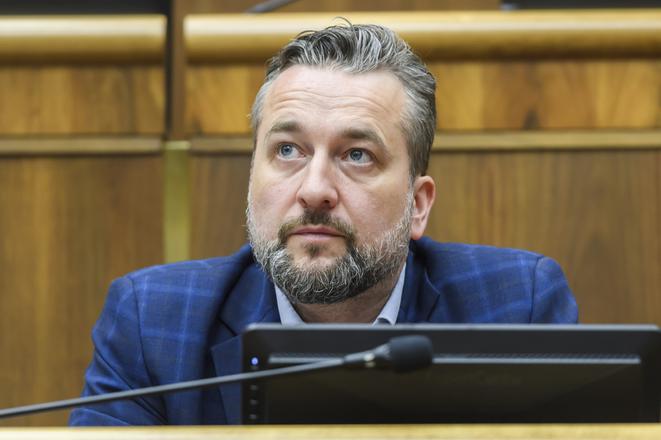There are few figures in Slovak politics as polarising as Ľuboš Blaha. An MEP for the ruling Smer party since 2024 and an MP since 2012, he has built a reputation on his pro-Russian stances, vocal opposition to mandatory vaccinations, and his frequent court cases for—among them, calling former President Zuzana Čaputová a traitor. He is highly active on social media, posting mainly on Telegram after being banned from Facebook.
Last month, The Slovak Spectator sat down with Blaha for a candid conversation about his views. The discussion ranged from his opinions on disinformation and online censorship to his opposition to gay marriage, Slovakia’s deep political divisions, and the country’s shifting foreign policy. While Blaha’s rhetoric often veers into conspiracy and provocation, his perspective provides insight into the worldview shaping the actions of Slovakia’s ruling party.
The interview was conducted on January 17, 2025.
You are often accused of spreading disinformation, and I gather that you disagree with this label. Do you believe there should be any boundaries or standards for identifying and addressing disinformation? If so, how do you propose defining it in a way that protects both freedom of speech and the public from harm?
A few years ago, I might have said yes—we need to protect the public from harmful information, disinformation, hoaxes, and so on. But now, I am more convinced that there should be absolute freedom of speech.
Of course, there must be some limits—such as when someone calls for violence or incites killings. In such cases, it should be punishable, as it is in the United States. But beyond that, there should be total freedom of speech.
I believe this model would work well in a country like Slovakia. At present, we have so-called “owners of the truth” who misuse terms like disinformation and hoaxes as tools of censorship. For example, when I discuss the war in Ukraine and cite scholars such as John Mearsheimer or Noam Chomsky—respected thinkers in the US—some people label it as disinformation. But how can that be disinformation? It is simply an interpretation of geopolitics.
The same issue arises in discussions about Palestine and Israel, or even during the Covid-19 pandemic. Some Nobel Prize laureates opposed the Covid-19 vaccines, yet their views were dismissed as disinformation or hoaxes. The concept of “disinformation” and “hybrid war propaganda” is often misused by liberals to suppress dissenting opinions.
This extends into the legal system and even the practices of privately owned media companies. I believe regulation is needed to ensure that companies handle information fairly, rather than imposing further restrictions on freedom of speech. I recall a time when Facebook allowed total freedom of speech. Back then, I was quite successful. But then, I was “eliminated.”
Things changed after Mark Zuckerberg met with Donald Trump and later came under pressure from the Joe Biden administration. Even Zuckerberg admitted that political pressure played a role in these changes. Now, everything is different.
Will you go back to Facebook?
I hope so, but it won’t be easy. I’m not Donald Trump. Still, this shows just how much politics is involved. People talk about neutral “fact-checking,” but there’s no such thing. It’s always political. Fact-checking is simply another way of interpreting reality, shaped by those who control the discourse.
Why should mainstream neoliberals or progressives dictate how people think and what opinions they can express? It’s absurd. It’s totalitarian.
I remember the socialist regime, where censorship was enforced by the Communist Party of Czechoslovakia. The party decided what was “harmful” and what wasn’t. They told people what they could and couldn’t say. What’s the difference today?
Now we have this liberal ideology, and if you oppose liberal democracy, you’re labelled harmful and silenced. Back then, you couldn’t criticise the communist regime. Today, it’s the same thing—different ideology, same censorship. What’s changed?


 MEP Ľuboš Blaha. (source: TASR)
MEP Ľuboš Blaha. (source: TASR)